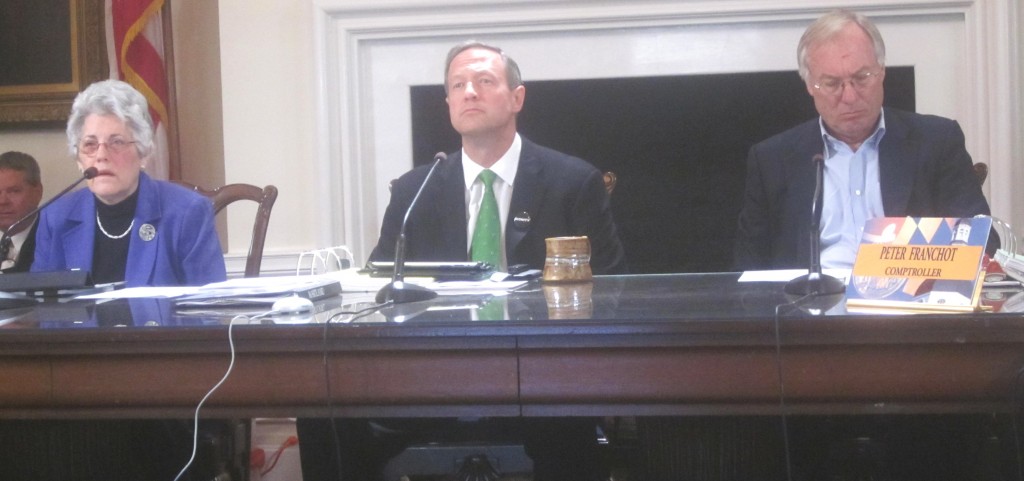Board of Public Works refuses to obey federal court order on attorney fees

Board of Public Works: State Treasurer Nancy Kopp, Gov. Martin OMalley and Comptroller Peter Franchot
By Ilana Kowarski
[email protected]
The Board of Public Works last Wednesday refused to obey a federal court order to pay nearly $200,000 to the attorneys of plaintiffs who successfully sued the State of Maryland for civil rights violations. The failure to act in this long-running legal battle drew a stinging rebuke from the American Civil Liberties Union.
“We think it is outrageous for the governor and comptroller to refuse to pay a judgment in a civil rights case that a federal court has ordered the State to pay,” said Debbie Jeon, legal director of the Maryland ACLU. “Playing political games now that the bills have come due will only waste more in taxpayer funds, as this forces us to pursue a collection action against the State.”
Comptroller Peter Franchot first raised objections to the judgment at last week’s board meeting, saying that it was “not appropriate,” and Gov. Martin O’Malley questioned why the state was being punished for actions he rescinded when he took office.
“This litigation required no litigation, because I changed the policy as soon as I got into office,” O’Malley said. “Do you mean to tell me that they [the plaintiffs] get more money on top of the money they shouldn’t have received?”
Court case over voter registration
The dispute began in 2006 when the Maryland Transit Administration started requiring citizens to obtain permits before staging political demonstrations or voter registration drives on public transit. Two ACORN employees were permanently banned from registering voters on Baltimore city buses and subways, and these employees sued in January 2007, claiming that the Transit Administration was interfering with constitutionally protected activity.
A federal district court agreed, and revoked the speech regulations, an action which O’Malley describes as “utter irrationality” since his administration had stopped enforcing them. The district court did not initially require the transit authority to compensate the plaintiffs’ attorneys, but the Fourth Circuit Court of Appeals overruled that decision, writing that “this is the very form of litigation Congress wished to encourage” by allowing civil rights plaintiffs to be compensated for their court costs since it “successfully vindicated important First Amendment rights.”
Assistant attorney general Matthew J. Fader warned the board that the plaintiffs could garnish state funds, and he said that it was highly unusual for a state to defy a federal court order. “I’m not aware of a precedent for a federal judgment that was not paid when it was rendered against an official operating in their official capacity,” he said.
But Franchot was undeterred. “With all due respect to the Fourth Circuit, I’m going to vote no,” he said. “I’m happy to see what compliance the plaintiffs plan to pursue.”
Franchot spokesman Joe Shapiro said that the comptroller was taking a “principled stand” against the federal court’s decision. “We disagree with the court. The civil rights issues were resolved very quickly by the governor. The lawsuit didn’t solve anything.”

MarylandReporter.com is a daily news website produced by journalists committed to making state government as open, transparent, accountable and responsive as possible – in deed, not just in promise. We believe the people who pay for this government are entitled to have their money spent in an efficient and effective way, and that they are entitled to keep as much of their hard-earned dollars as they possibly can.
